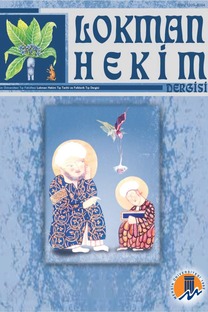Kolonyanın İşlevi: Dünü ve Bugünü
The function of Eau de Cologne: From Past to Today
___
- 1. Moeran BB. Cultural Production, Creativity and Constraints Keywords 2009;(November):1–24.
- 2. Blanco-da F. Cosmetic Special Topic Beauty and the Body: The Origins of Cosmetics. 1999;1196–204.
- 3. Lucas A. Ancient Egypt. J Egypt Archaeol 1930;16(1–2):41–53.
- 4. Çomoğlu T. Kozmetikler. Marmara Pharm J 2012;16:1–8. 5. Azak Sungur S, Sözen Şahne B, Yeğenoğlu S. Kozmetik Ürünlerin Tarihçesi, Ürün Tanıtımlarının Yasal Durumu ve Tüketici Davranışı Açısından Değerlendirilmesi. Mersin Üniversitesi Tıp Fakültesi Lokman Hekim Tıp Tarihi ve Folklorik Tıp Dergisi 2018;8(3):191-197.
- 6. Tuncer S. Eyüp Sabri Tuncer, EST Eyüp Sabri Tuncer Kimya-Gıda-Ambalaj Sanayi Anonim Şirketi Ankara. 1996.
- 7. Akın L. Jenerik Marka İsimlerinin Oluşumu Ve TDK Sözlüğüne Giriş Şekilleri. Journal of International Social Research 2014;7(31):19-28.
- 8. Troyansky DG. Beauty Imagined : A History of the Global Beauty Industry . By Geoffrey Jones Oxford : Oxford University Press, 2010; 233–5.
- 9. Touw MIA. Roses in the Middle Ages. Economic Botany 2013;36(1):71–83.
- 10. Pons-Guiraud A. Progrès en Dermato-Allergologie. Dijon: John Libbey Eurotext; 2002.
- 11. Gâdea Ş, Anamaria Vâtcă SV. The History and Use of Perfume in Human. Agric Sci Pract 2017;4(3):161–6.
- 12. Britannica. Cologne [Internet]. [cited 2021 Jan 5]. Available from: https://www.britannica.com/art/cologne
- 13. Roudnitska E. Le Parfum (6th Edition). Paris Presses Universitaitas de France; 2000.
- 14. SkyLife. Bir Damla Ferahlık Kolonya. 2021 [cited 2021 Jan 7] Available from: http://promotion.turkishairlines.com/documents/thy/skylife/archive/tr/2001_4/konu5.htm#1
- 15. Kılıçer M. Osmanlı’dan Cumhuriyet Dönemine Türkiye’de Koku Endüstrisi. Marmara Üniversitesi Sosyal Bilimler Enstitüsü: Yüksek Lisans Tezi; 2019.
- 16. Carrement Belle Perfumes [Internet]. [cited 2021 Jan 5]. Available from: https://www.carrementbelle.com/en/
- 17. Yentürk A. İlk Yerli Parfümör - Ahmet Faruki Osmanlı Kolonyası. Tar ve Bilim [Internet]. [cited 2021 Jan 7].Available from: https://www.tarihvebilim.com/ilk-yerli-parfumor-ahmet-faruki-osmanli-kolonyasi/
- 18. Scatena J. Turkey’s unique hand-sanitising method. BBC Travel 2021;1–25.
- 19. Rose L, Noe N De. A Smelling Trip into the Past: The Influence of Synthetic Materials on the History of Perfumery 2008;5:1137–46.
- 20. Türkiye Odalar ve Borsalar Birliği. Türkiye Kozmetik ve Temizlik Ürünleri Sanayi Raporu/2017. Ankara; 2018.
- 21. Selin Kolonya. 1912 - Altın Damlası [Internet]. [cited 2021 Jan 10]. Available from: https://www.selin.com.tr/Hakkimizda
- 22. JCR Kozmetik Perakende Mağazacılık Ticaret A.Ş. Hakkımızda [Internet]. [cited 2021 Jan 16]. Available from: https://www.rebul.com/hakkimizda
- 23. EST 1923 Perakende ve İnteraktif Mağazacılık Tic. Ltd. Şti. Tarihçe [Internet]. [cited 2021 Jan 16]. Available from: https://www.eyupsabrituncer.com/tarihce
- 24. Haber Merkezi. Pereja’nın ismi sahibinin üç çocuğunun adından geliyor [Internet]. [cited 2021 Jan 10]. Available from: https://www.ekopara.com/foto-galeri/pereja-nin-ismi-sahibinin-uc-cocugunun-adindan-geliyor
- 25. Pereja ileri Kimya Sanayi A.Ş. Hakkımızda [Internet]. [cited 2021 Jan 10]. Available from: https://www.perejastore.com/Sayfalar/hakkimizda-13/
- 26. World Health Organization. World Health Organization Model List of Essential Medicines, 21st List. Geneva; 2019.
- 27. Centers for Disease Control and Prevention. Recommendations of the Healthcare, Infection Control Practices Advisory Committee. Centers for Disease Control and Prevention Guideline for Hand Hygiene in Health-Care Settings [Internet]. [cited 2021 Jan 10]. Vol. 51. 2002. Available from: https://www.cdc.gov/mmwr/PDF/rr/rr5116.pdf
- 28. Centers for Disease Control and Prevention. Chemical Disinfectants [Internet]. Guideline for Disinfection and Sterilization in Healthcare Facilities. [cited 2021 Jan 10]. Available from: https://www.cdc.gov/
- 29. Yıldırım A, Şimşek H. Sosyal Bilimlerde Nitel Araştırma Yöntemleri. Seçkin Yayıncılık; 2016.
- 30. Bilgin N. Sosyal Bilimlerde İçerik Analizi. Ankara. Siyasal Kitabevi; 2014.
- 31. Türkiye Odalar ve Borsalar Birliği. Türkiye Kozmetik ve Temizlik Sanayii Ürünleri Sektör Raporu. Ankara; 2008.
- 32. Gürgen A, et al. Evaluation of Olive and Date-plum Tree Heartwoods’ Essentials Oils’ in Cologne Production and Determination of Consumer Attitudes. Turkish J Life Sci 2018;3(October):267–71.
- 33. Öǧütlü H. Turkey’s response to COVID-19 in terms of mental health. Ir J Psychol Med 2020;37(3):222–5. 34. Ünsal A. Türk Kültüründe Geleneksel Hasta Bakımı: Anadolu Örneği. Yeni Yüzyıl Üniversitesi Sos Bilim Enstitüsü Derg 2019;53(9):1689–99. 35. Dushime CE, Hashemipour S. The Psychological Effect of the COVID-19 Pandemic in Turkey and the World at the Context of Political Psychology. Eurasian J Res Soc Econ 2020;7(6):75–86.
- 36. Leslie RA, Zhou SS, Macinga DR. Inactivation of SARS-CoV-2 by commercially available alcohol-based hand sanitizers. Am J Infect Control 2020;1(2):19–21.
- ISSN: 1309-761X
- Yayın Aralığı: 3
- Başlangıç: 2010
- Yayıncı: OYA ÖGENLER
Hatice YAĞCI, Nuray DAYAPOĞLU, Ömer KARAŞAHİN
Jinekolojik Kanserlerde Destek Tedavi Olarak Mantar Kullanımı
ŞERİFE EFSUN ANTMEN, OYA ÖGENLER
Ne Kadar Başarılı Yaşlanıyoruz?
Türkiye’de Medikal Fizik Yüksek Lisans Programlarındaki Etik Eğitimi Üzerine Bir Araştırma
COVID-19 Pandemisinin Tıp Tarihi ve Etiği Açısından İncelenmesi
Kolonyanın İşlevi: Dünü ve Bugünü
BİLGE SÖZEN ŞAHNE, Leyla YUMRUKAYA, Selen YEĞENOĞLU
Hasta ve Hemşirelerin Perspektifinden İyi Hemşire: Nitel Bir Çalışma
İpek Köse TOSUNÖZ, Meltem AKBAŞ, Gürsel ÖZTUNÇ
Biyoetik Teriminin Ortaya Çıkışı ve Türkiye’deki Yansımaları
Abdullah YILDIZ, Rukiye KAYA, Serap ŞAHİNOĞLU
Hemşirelik Öğrencilerinin El Hijyeni Ve Eldiven Kullanma Alışkanlıklarının Belirlenmesi
